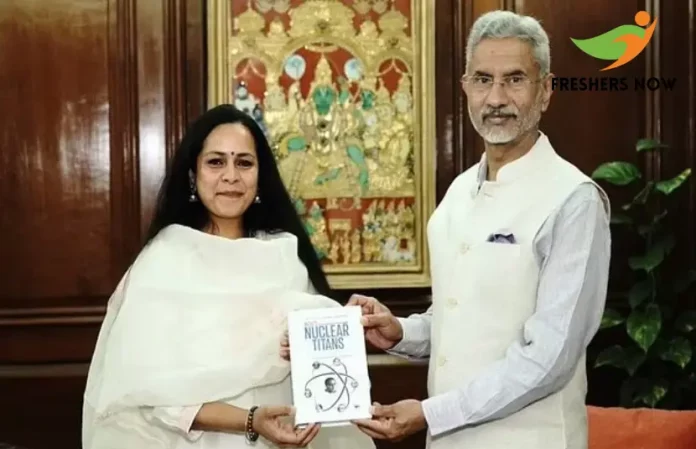
EAM Jaishankar Receives Book ‘India’s Nuclear Titans’: India’s External Affairs Minister, Dr. S. Jaishankar, was recently presented with the book titled ‘India’s Nuclear Titans,’ a comprehensive exploration of India’s nuclear program and its key architects. Hence, this notable event underscores India’s journey as a nuclear power and the pivotal role played by visionary leaders in shaping its nuclear doctrine.
EAM Jaishankar Receives Book ‘India’s Nuclear Titans’
The presentation of ‘India’s Nuclear Titans‘ to External Affairs Minister Jaishankar signifies a tribute to India’s nuclear pioneers and their enduring legacy. As India navigates the complexities of the global nuclear landscape, understanding the foundational principles and leadership behind its nuclear program is essential. Therefore, the book serves as a reminder of India’s journey as a responsible nuclear power and the imperative of safeguarding its national security interests in an uncertain world.
The Significance of the Book Presentation
The presentation of ‘India’s Nuclear Titans’ to External Affairs Minister Jaishankar holds significant symbolism, highlighting the importance of India’s nuclear capabilities in the contemporary geopolitical landscape. As India continues to assert its position on the global stage, understanding the historical context and strategic imperatives of its nuclear program becomes paramount.
Exploring India’s Nuclear Legacy
The book ‘India’s Nuclear Titans’ delves into the evolution of India’s nuclear program, tracing its origins, challenges, and milestones. So, it offers insights into the vision and leadership of eminent figures such as Dr. Homi J. Bhabha, Dr. Raja Ramanna, and Dr. APJ Abdul Kalam, who played instrumental roles in establishing and advancing India’s nuclear capabilities.
Dr. Homi J. Bhabha: The Architect of India’s Nuclear Program
Dr. Homi J. Bhabha, often referred to as the “father of the Indian nuclear program,” laid the foundation for India’s nuclear aspirations. Meanwhile, his pioneering efforts in nuclear research and advocacy for indigenous development set the stage for India’s emergence as a nuclear power.
Dr. Raja Ramanna: A Trailblazer in Nuclear Science
Dr. Raja Ramanna, a distinguished nuclear physicist and administrator, made significant contributions to India’s nuclear program, including the successful conduct of the Pokhran-I nuclear tests in 1974. Moreover, His expertise and leadership were instrumental in advancing India’s nuclear capabilities.
Dr. APJ Abdul Kalam: The Missile Man of India
Dr. APJ Abdul Kalam, renowned as the “Missile Man of India,” played a pivotal role in India’s nuclear and missile development programs. Therefore, his visionary leadership and technological acumen propelled India’s missile capabilities to new heights, culminating in the successful Pokhran-II nuclear tests in 1998.
India’s Nuclear Doctrine and Strategic Imperatives
The book ‘India’s Nuclear Titans’ also examines India’s nuclear doctrine and the strategic imperatives that shape its nuclear policy. And it elucidates India’s commitment to a credible minimum deterrent and its stance on no-first-use, emphasizing a responsible approach to nuclear deterrence.
Follow Freshersnow.com for more updates.
| You can Also Check |
| Current Affairs |



